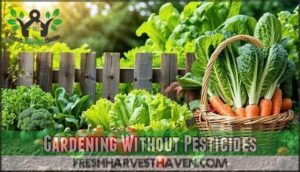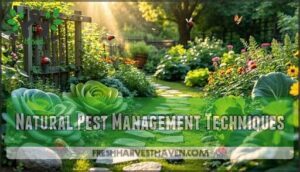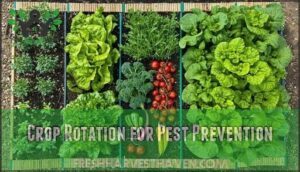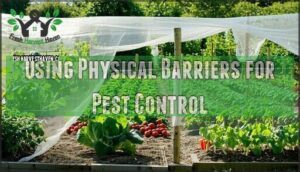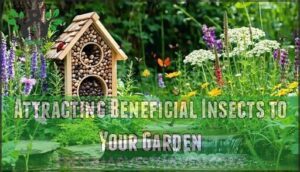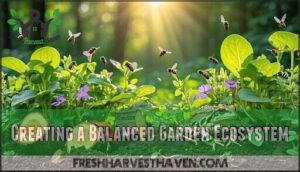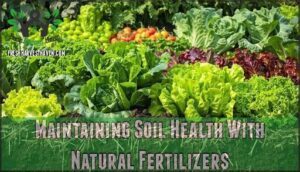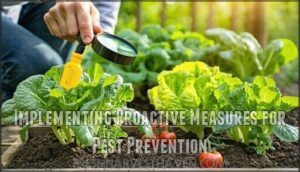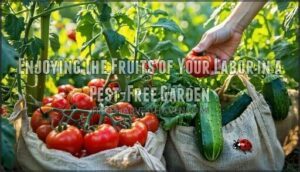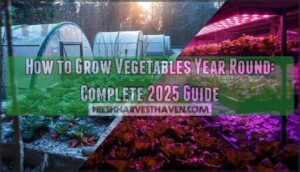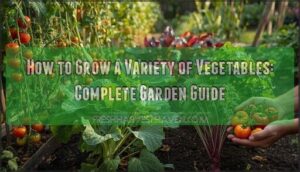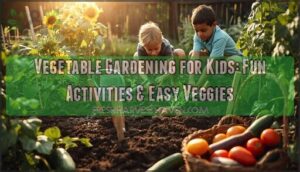This site is supported by our readers. We may earn a commission, at no cost to you, if you purchase through links.
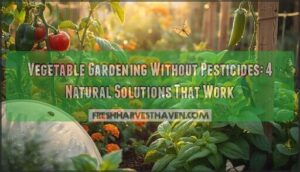
Vegetable gardening without pesticides relies on four key strategies: creating physical barriers like row covers, using natural soap sprays to deter soft-bodied insects, encouraging beneficial predators through strategic plantings, and maintaining healthy soil that naturally resists pests.
Companion planting—like growing marigolds with tomatoes or basil with peppers—creates natural pest deterrents while attracting helpful insects.
Motion-activated sprinklers keep larger critters at bay, while bird feeders positioned strategically turn feathered friends into your personal pest patrol squad.
The secret isn’t eliminating all bugs, but creating a balanced ecosystem where good insects keep the troublemakers in check.
Your garden becomes a self-regulating paradise that produces cleaner, safer vegetables, by working with nature to maintain a healthy and thriving environment, which is the key to successful vegetable gardening without synthetic pesticides.
Table Of Contents
- Key Takeaways
- Gardening Without Pesticides
- Top 4 Pest Control Solutions
- Natural Pest Management Techniques
- Building a Sustainable Garden
- Frequently Asked Questions (FAQs)
- Can you grow vegetables without chemicals?
- Can you use nature to grow a vegetable garden?
- Should you start an organic vegetable garden?
- What are the benefits of gardening without pesticides?
- How do you control pests in a vegetable garden?
- Is an organic vegetable garden a good idea?
- Is it possible to grow vegetables without pesticides?
- What is the best natural pesticide for vegetable gardens?
- What vegetable has the least pesticides?
- What are vegetables grown without pesticides called?
- Conclusion
Key Takeaways
- Work with nature’s pest control system – You’ll create a balanced ecosystem where beneficial insects like ladybugs and lacewings naturally control harmful pests, eliminating the need for synthetic chemicals.
- Build healthy soil as your foundation – You’ll strengthen your garden’s immune system by adding compost and organic matter that feeds beneficial microbes, creating naturally pest-resistant plants.
- Use physical barriers for immediate protection – You’ll stop pests before they strike by installing row covers, netting, and motion-activated sprinklers that create an effective defense without chemicals.
- Plant strategic companions for natural deterrents – You’ll repel pests naturally by growing marigolds with tomatoes and basil with peppers, creating a self-regulating garden that maintains its own pest control.
Gardening Without Pesticides
You don’t need harsh chemicals to grow healthy vegetables that taste amazing. Natural pest control methods protect your plants while keeping your soil, water, and family safe from toxic residues.
Environmental Impact of Pesticides
Your garden sprays don’t stay put—they travel far beyond your fence line. Over 98% of applied insecticides miss their targets, creating widespread toxic runoff and water contamination.
Here’s what happens when pesticides escape your yard:
- Soil pollution kills beneficial microorganisms that keep plants healthy
- Ecosystem damage spreads through groundwater for miles
- Biodiversity loss eliminates helpful insects and soil organisms
- Chemical residues persist in waterways for decades
- Production emissions contribute to climate change
Pesticide free gardening protects ecosystems while chemical runoff prevention through sustainable gardening practices keeps our planet healthier. Understanding the impact of pesticide use is essential for maintaining a balanced environment.
Benefits of Organic Gardening
You’ll grow organic produce that’s free from chemical residues, giving your family safer, more nutritious vegetables.
This eco friendly approach creates a healthy ecosystem where beneficial insects thrive, naturally controlling pests without harmful sprays.
Sustainable gardening practices using natural fertilizers build stronger soil that produces healthier plants.
Your chemical free gardening methods protect local waterways while reducing grocery costs through homegrown abundance.
Importance of Soil Health
Your soil is where the real magic happens. Think of soil health as your garden’s immune system—when it’s strong, your plants naturally resist pests and diseases without chemicals.
Healthy soil is your garden’s immune system—strong soil grows naturally pest-resistant plants.
Soil Structure starts with Organic Matter like compost, which feeds beneficial microbes. These tiny workers create Microbial Balance that breaks down nutrients for your plants. Good Compost Management means adding 1-2 inches of finished compost each season.
Nutrient Cycling happens when soil microbes convert organic materials into plant-available food. This natural process strengthens root systems and improves water retention. Your plants develop thicker cell walls that pests can’t easily penetrate.
Organic soil preparation beats chemical shortcuts every time. Start with a soil test, then add what’s missing naturally. Soil fertility improves gradually as beneficial organisms multiply. You’ll notice stronger plants that shrug off pest attacks—that’s your soil doing the heavy lifting for natural pest control.
By understanding the health benefits of organic gardening, you can create a thriving ecosystem that promotes overall well-being.
Role of Beneficial Insects in Pest Control
Your garden’s beneficial insects work around the clock as pest predators without costing you a dime.
Ladybug benefits include consuming 5,000 aphids per lifetime, while lacewings hunt at night.
These tiny warriors provide biological control through natural pest control methods that outperform chemicals.
Plant diverse flowers using companion planting to create insect habitats that support bee conservation.
This approach transforms your organic gardening methods into a self-sustaining pest management system where nature handles the dirty work.
Understanding beneficial insect roles is essential for maintaining a balanced ecosystem in your garden.
Top 4 Pest Control Solutions
When pests threaten your chemical-free garden, you’ll need reliable solutions that won’t harm your vegetables or the environment.
These four proven tools offer effective pest control while keeping your organic gardening goals intact, providing a way to maintain a chemical-free garden.
1. Dr Bronner’s Baby Unscented Castile Soap

When you’re battling garden pests without harsh chemicals, Dr. Bronner’s Baby Unscented Castile Soap becomes your secret weapon for natural pest control. This organic soap contains over 70% certified organic ingredients, making it perfect for chemical-free gardening.
Mix one tablespoon with a quart of water to create an effective insecticidal soap that targets soft-bodied pests like aphids, spider mites, and mealybugs.
The soap benefits extend beyond pest management:
- Biodegradable formula won’t contaminate soil or waterways
- Gentle cleaner that’s safe around beneficial insects when used properly
- Concentrated formula provides excellent value for multiple seasons
- Works as part of thorough organic gardening methods
Unlike synthetic pesticides, this natural pesticide breaks down quickly in the environment. You’ll protect your plants while maintaining the delicate balance your garden ecosystem needs. The unscented formula won’t overwhelm sensitive plants, and its versatility makes it an essential tool for effective pest management without compromising your commitment to organic practices.
2. De-Bird Garden Protection Netting for Plants
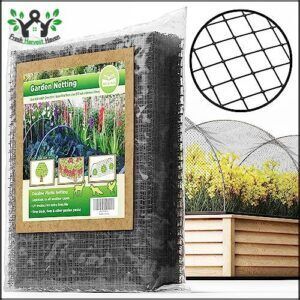
Wrapping your vegetables in protective netting creates an impenetrable fortress against hungry invaders. De-Bird Garden Protection Netting transforms your garden into a safe haven where crops flourish without chemical interference.
This durable 7.5x65ft green mesh serves as the ultimate garden shield, blocking birds, deer, rabbits, and squirrels while allowing essential sunlight and water to reach your plants. The netting materials are lightweight yet tough enough to withstand weather and determined garden pests.
Installation couldn’t be simpler—cut to size and secure with garden spikes or cable ties. You’ll notice increased crop yields once this pest barrier is in place. The mesh acts as invisible armor, providing bird protection without harming wildlife.
While crafty critters might occasionally test the boundaries, regular inspection keeps your defenses strong. Secure all edges tightly to prevent sneaky animals from finding entry points underneath your plant covers. Effective summer garden pest control strategies also involve maintaining a balanced ecosystem to prevent infestations.
Best For: Gardeners seeking durable, reusable bird deterrents that protect crops humanely through effective pest management.
3. Havahart Motion Activated Animal Repellent

When stubborn animals treat your vegetable garden like their personal buffet, the Havahart Motion Activated Animal Repellent provides effective wildlife control without chemicals.
This eco friendly device uses infrared sensors to detect movement up to 100 feet away, then releases a harmless water spray that sends intruders scrambling.
Key features that make this pest deterrent stand out:
- Four sensitivity levels target different animal sizes from squirrels to deer
- Day/night operation modes adapt to your garden’s specific needs
- Weather-resistant construction withstands outdoor conditions year-round
- Water-efficient design uses only 2-3 cups per activation
- Solar-powered option eliminates battery replacement hassles
This motionactivated repellent works by conditioning animals to avoid your space entirely.
After a few surprising encounters, most wildlife learns to steer clear of your vegetables.
It’s natural pest control that protects your organic gardening techniques while maintaining your commitment to chemicalfree gardening practices.
Best For: Gardeners seeking humane, sustainable pest management solutions.
4. Perky Pet Copper Panorama Bird Feeder
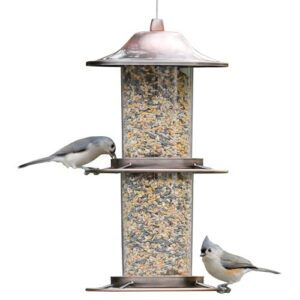
While motion-activated sprinklers work great for larger pests, you’ll need Bird Feeders to tackle smaller garden invaders.
The Perky Pet Copper Panorama Bird Feeder transforms your organic gardening strategy by recruiting nature’s best pest control team. This dual-tier design attracts diverse Garden Birds that devour aphids, caterpillars, and other troublesome insects plaguing your vegetable gardening without pesticides efforts.
The antique copper finish adds elegance while the 360-degree perch accommodates multiple feeding positions.
| Feature | Benefit |
|---|---|
| 4.5-pound capacity | Less frequent refilling |
| Sure-Lock cap | Effective squirrel deterrent |
| Drain holes | Prevents seed spoilage |
| Circular perch design | Accommodates various bird sizes |
| Weather-resistant copper | Long-lasting durability |
The built-in Pest Deterrents keep squirrels away while welcoming beneficial avian allies. You’ll create a balanced ecosystem where natural pest control thrives alongside beneficial insects, making this feeder an essential component of your chemicalfree gardening arsenal.
Best For: Gardeners wanting thorough pest management through Bird Attractants while enhancing garden aesthetics.
Natural Pest Management Techniques
Now that you’ve chosen your pest control tools, you’ll need proven techniques to make them work effectively in your garden.
These natural management strategies focus on prevention and ecosystem balance rather than reactive chemical treatments.
Companion Planting Strategies
Beyond commercial products, companion planting creates your garden’s natural defense system.
These plant partners work together through strategic garden layout planning.
Aromatic herbs like basil and rosemary repel pests while attracting beneficial insects.
Marigolds release natural pesticides from their roots, killing nematodes.
Botanical allies like nasturtiums act as trap crops, luring aphids away from vegetables.
This organic gardening approach transforms crop planning into effective pest management without chemicals.
By understanding companion planting techniques, gardeners can optimize their garden’s natural balance.
Crop Rotation for Pest Prevention
Crop rotation transforms your pest prevention strategy by disrupting pest cycling patterns.
You’ll move plant families to different garden sections each year, starving pests of their preferred hosts.
This rotation strategy prevents soil-dwelling insects from establishing permanent colonies.
Smart crop planning involves mapping three-year cycles where heavy feeders like tomatoes follow nitrogen-fixing legumes.
Seasonal management becomes easier when you track which families occupied each bed.
Your soil preparation benefits too—different crops contribute unique nutrients and root structures.
This natural pest control method supports organic gardening principles while maintaining vegetable gardening without chemicals.
Effective crop rotation techniques require understanding of soil health benefits to maximize the positive impact on your garden.
Using Physical Barriers for Pest Control
Physical barriers create an invisible fortress around your vegetables, stopping pests before they strike. These simple tools work around the clock without chemicals or constant monitoring.
Row Covers act like greenhouse walls, protecting seedlings from insects while letting sunlight and water through. Netting Systems keep birds from stealing your berries and tomatoes. Barrier Fencing stops rabbits and deer from turning your garden into their personal buffet. Plant Guards shield individual plants from cutworms and other ground-dwelling pests. Crop Shields provide weather protection during unexpected storms.
Choose the right barrier for each threat:
- Garden mesh protects against flying insects and small pests
- Heavy-duty netting handles larger birds and animals
- Copper strips deter slugs and snails naturally
- Wire cages protect tomatoes from multiple angles
- Floating row covers extend growing seasons safely
These physical barriers give you control over your garden’s protection while keeping your vegetables completely chemical-free. Effective garden netting systems are essential for a pest-free garden.
Attracting Beneficial Insects to Your Garden
Transform your garden into a beneficial insects paradise by planting diverse pollinator gardens with dill, fennel, and cosmos.
These natural habitats support ladybugs, lacewings, and parasitic wasps that devour garden pests.
Create insect hotels using leaf litter and shallow water sources.
Companion planting with herbs provides nesting sites while boosting garden biodiversity.
This natural pest control approach strengthens organic gardening and pollinator health naturally.
Building a Sustainable Garden
Building a sustainable vegetable garden means creating a system that works with nature instead of against it.
You’ll discover that healthy soil, beneficial insects, and smart planning create a thriving ecosystem that practically manages itself, utilizing nature to its fullest potential.
Creating a Balanced Garden Ecosystem
A thriving garden ecosystem starts with ecosystem balance and biodiversity conservation. Think of your garden as nature’s orchestra – every player matters.
Soil microbes form the foundation, creating ecosystem services that strengthen plant immunity.
Here’s how to build natural habitats for organic gardening success:
- Install predator shelters like logs or stone piles to welcome natural pest controllers
- Plant diverse flowers that attract beneficial insects for natural pest control
- Skip chemicals to preserve the food web, ensuring your balanced ecosystem supports chemical-free vegetable gardening
Maintaining Soil Health With Natural Fertilizers
Building natural fertilizers into your soil routine creates a powerhouse foundation.
Compost benefits include feeding hungry soil microbes that boost nutrient cycling by 24%. Mix organic matter like kitchen scraps with manure—chicken, cow, or horse varieties add essential nutrients.
Mulch effects retain moisture while suppressing weeds. These amendments increase microbial biomass three times compared to synthetic options, ensuring your nutrient-dense produce thrives naturally.
Using natural fertilizers can enhance soil health substantially.
Implementing Proactive Measures for Pest Prevention
Stay ahead of garden pests through early detection—inspect plants daily for damage or unusual signs.
Start with soil testing and garden planning to choose pest-resistant varieties.
Maintain excellent crop monitoring habits by removing debris and diseased plants promptly.
Set up pest traps around vulnerable crops.
Apply organic sprays like neem oil when needed.
This integrated pest management approach combines natural pest control methods for effective pest prevention without chemicals.
Enjoying The Fruits of Your Labor in a Pest-Free Garden
Garden harmony emerges when you finally harvest chemical-free vegetables from your thriving plot. Your organic methods have paid off beautifully.
Here’s how to maximize your healthy harvest:
- Use proper harvesting techniques to encourage continued production
- Protect ripening fruit with organza bags or fine netting
- Embrace beneficial insects—they’re nature’s green living allies
- Wash produce thoroughly before enjoying your pest-free gardening success
Natural pest management delivers worry-free bounty! Consider using companion planting strategies to naturally deter pests, achieving a truly organic and chemical-free harvest with proper harvesting techniques.
Frequently Asked Questions (FAQs)
Can you grow vegetables without chemicals?
While synthetic chemicals promise quick fixes, you can absolutely grow thriving vegetables naturally.
Use companion planting, beneficial insects, compost, and organic mulch to create healthy soil that naturally resists pests and diseases, which helps in growing thriving vegetables.
Can you use nature to grow a vegetable garden?
You’ll harness nature’s own pest control system by attracting beneficial insects like ladybugs and planting companion herbs that repel harmful bugs naturally.
Should you start an organic vegetable garden?
Picture crisp lettuce leaves glistening with morning dew in your backyard sanctuary.
You’ll absolutely thrive growing organic vegetables—they’re healthier, tastier, and you’ll dodge harmful chemicals while nurturing beneficial soil microbes that naturally protect your plants, making them healthier.
What are the benefits of gardening without pesticides?
You’ll protect your family’s health by eliminating toxic residues from your vegetables.
Your soil stays rich with beneficial microbes, and you’ll save money while creating a thriving ecosystem that naturally controls pests.
How do you control pests in a vegetable garden?
Struggling with garden pests?
You’ll control them naturally using companion plants like chives and mint, attracting beneficial insects such as ladybugs.
Applying neem oil or diatomaceous earth, and using physical barriers.
Is an organic vegetable garden a good idea?
Yes, organic vegetable gardens are excellent choices. You’ll reduce chemical exposure, protect beneficial insects, improve soil health, and grow nutrient-dense produce while saving money long-term.
Is it possible to grow vegetables without pesticides?
Like nature’s own security system, you can absolutely grow thriving vegetables without pesticides. Companion plants, beneficial insects, and healthy soil create natural defenses that’ll keep your garden productive and pesticide-free.
What is the best natural pesticide for vegetable gardens?
Neem oil stands out as your garden’s best natural defense against pests.
It disrupts insect hormone systems while being safe for beneficial pollinators and soil organisms, making it perfect for chemical-free vegetable growing, with Neem oil as the key component.
What vegetable has the least pesticides?
Picture pristine produce as nature’s armor against chemical warfare.
Root vegetables like carrots, beets, and potatoes naturally absorb fewer pesticides than leafy greens.
You’ll find onions, sweet corn, and asparagus consistently rank lowest for pesticide residues.
What are vegetables grown without pesticides called?
Vegetables grown without synthetic pesticides, herbicides, or chemical fertilizers are called "organic vegetables." You’ll find them certified organic at stores or can grow your own pesticide-free produce at home.
Conclusion
Picture your garden as nature’s boardroom, where every creature has a role in maintaining order.
You’ve learned that vegetable gardening without pesticides isn’t about fighting nature—it’s about partnering with it.
These four natural solutions create a self-sustaining system where beneficial insects handle pest control while physical barriers protect your crops.
Your soil stays healthy, your vegetables grow clean, and you’ll discover that working with nature’s own pest management system produces better results than any chemical shortcut ever could.
- https://www.ncbi.nlm.nih.gov/pmc/articles/PMC2984095/
- https://www.telegraph.co.uk/gardening/problem-solving/peat-bad-environment-best-sustainable-alternatives-gardens-summer-uk-2022/
- https://chippindaleplant.com/
- https://www.projectnoah.org/spottings/1296056418
- https://store.farmersalmanac.com/FARM/p-FA___1818OUTBACK

